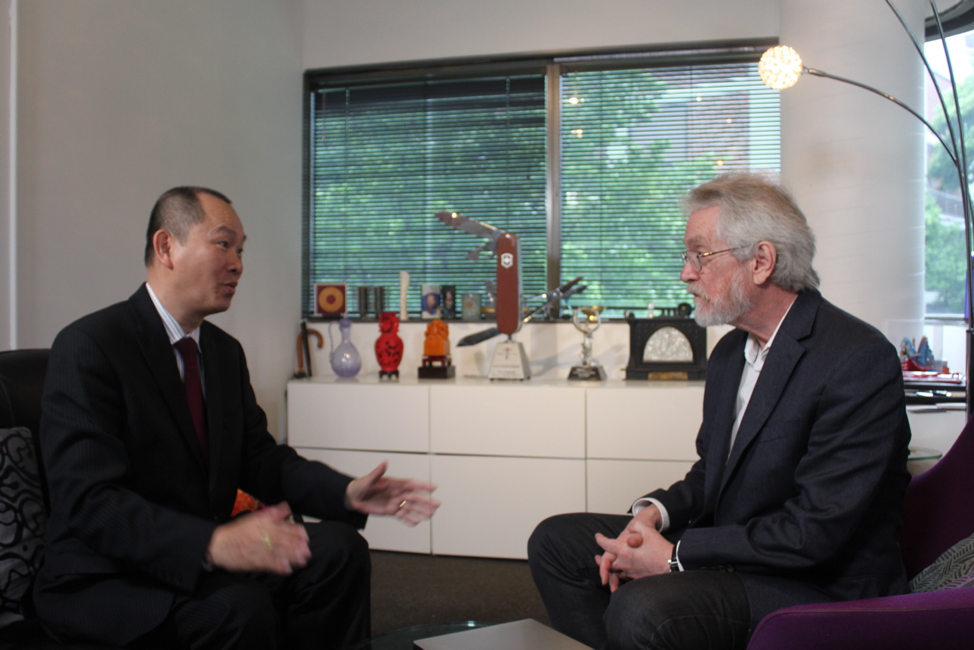
by Editor | Nov 13, 2022 | Global Alliance for Digital Governance
MIT Professor Sandy Pentland, Board Members of Michael Dukakis Institute and Distinguished Contributor of the book “Remaking the World – Toward an Age of Global Enlightenment” will present Keynote “Building the New Economy: What We Need and How to Get There” on Day “Building the New Economy: Data as Capital” in Stanford Digital Assets Week.
To support a world with billions of data owners, producers, and consumers, governed by digital data and AI, we need to build infrastructure that enables interoperability across company and national boundaries. This infrastructure will determine the future of finance and money, civic engagement, and factors that contribute to human flourishing. This panel discussion explores the opportunities and challenges of designing ecosystems of trusted data and AI that provide safe, secure, and human-centered services for everyone.
Read more about the event here.
The Global Alliance for Digital Governance supports this idea, and add requirements of respecting the standards of the Social Contract for the AI Age.

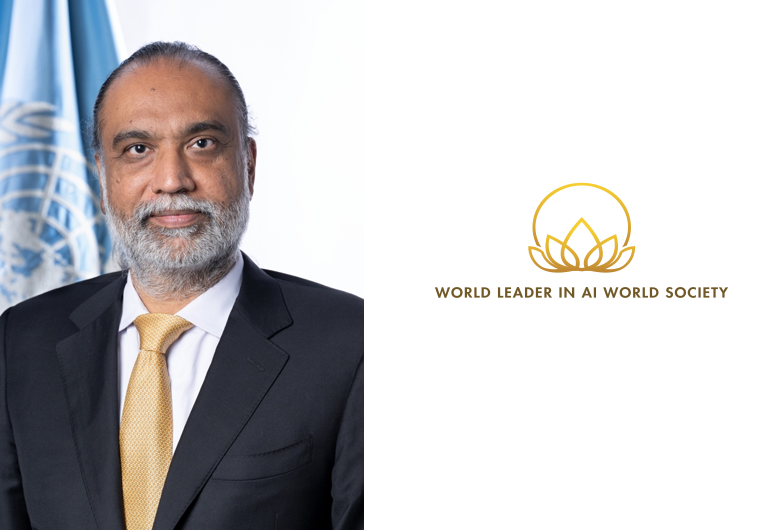
by Editor | Nov 11, 2022 | Statements, News
November 22 event draws world leaders, thinkers and diplomats for exchange on AIWS Actions to create the Global Enlightenment Age

Cambridge, MA Nov 11, 2022 – The Boston Global Forum (BGF) is pleased to announce that the Technology Envoy to the United Nations Secretary General, Ambassador Amandeep Gill, will accept the World Leader in AIWS Award and present the keynote address at the BGF’s 10th anniversary Forum on November 22 at Harvard University’s Loeb House.
Ambassador Gill is a pioneer of international cooperation on the governance of artificial intelligence (AI), a passionate advocate of inclusive, responsible and collaborative applications of data and AI to the Sustainable Development Goals (SDGs), and United Nations Secretary-General’s Envoy on Technology.
The United Nations is championing a Global Digital Compact and Roadmap for Digital Cooperation under the leadership of Mr. Gill. These will be important areas of discussion at the United Nations Summit of the Future in 2024.
The Boston Global Forum has been actively involved in global discussions with high impact organizations with pioneering initiatives in AI and Digital Governance. Its recent book, “Remaking the World – Toward an Age of Global Enlightenment” captures the best thinking about the need to coordinate actions and policies to guarantee rights and privacy. BGF established Global Alliance for Digital Governance (GADG) to coordinate global resources for this mission: create the Global Enlightenment Age.
WHAT: UN Technology Envoy Amandeep Gill to deliver keynote address at Boston Global Forum 10 Anniversary Forum
WHEN: Tuesday, November 22, 2022, 2:30p.m.-5:30 pm,
WHERE: Harvard University’s Loeb House, 17 Quincy Street, Cambridge, MA
WHO: Mr. Gill, Former Governor Michael Dukakis, Tuan Nguyen, CEO of Boston Global Forum. For full agenda and list of distinguished speakers, please visit: https://bostonglobalforum.org/bgf-events/
About Boston Global Forum and AI World Society
The Boston Global Forum (BGF) offers a venue for world leaders, strategists, thinkers, and innovators to contribute to the process of Remaking the World – Toward an Age of Global Enlightenment. The BGF introduced core concepts that are shaping groundbreaking international initiatives, most notably, the Social Contract for the AI Age, AI International Law and Accord, the Global Alliance for Digital Governance, the AI World Society (AIWS) Ecosystem, and the AIWS City.
Co-founders of the Boston Global Forum are Governor Michael Dukakis, Nguyen Anh Tuan, Founder & Editor-in-Chief of VietNamNet (1997-2011), Harvard Professors Thomas Patterson, and John Quelch.
The evolution of Artificial Intelligence holds great promise in a wide variety of sectors but can also be used in damaging ways, including political manipulation and unwarranted surveillance. For this reason, Michael Dukakis Institute has created the Artificial Intelligence World Society Initiative (AIWS) as a means of counteracting harmful and unethical uses of AI, and building the 7-layer AI model, including ethics, to achieve a peaceful and secure world.
The mission of AIWS is to develop recommendations for the development and implementation of AI in ways that promote the public interest. This includes:
- Develop an ethical framework for the use of AI.
- Create Social Contract for the AI Age, AI International Accord, and Global Alliance for Digital Governance
- Innovate technical protocols to enhance cybersecurity and protect privacy.
- Building AI-Government, the AIWS City, and AI Initiatives in Politics and Society.
Contacts:
Tuan Nguyen, CEO of the Boston Global Forum:
Email: [email protected]
Phone: 617 286 6589
Jim McManus:
Email: [email protected]
Phone: 617-413-9232
PDF of the PR AIWS Award Amandeep, November 22.

by Editor | Nov 6, 2022 | News
Pictures of the Symposium “Technology for Peace and Democracy in the Age of Global Enlightenment” at John Cabot University in Rome October 25, 2022.


Francesco Lapenta, Director Institute of Future and Innovation Studies, John Cabot University
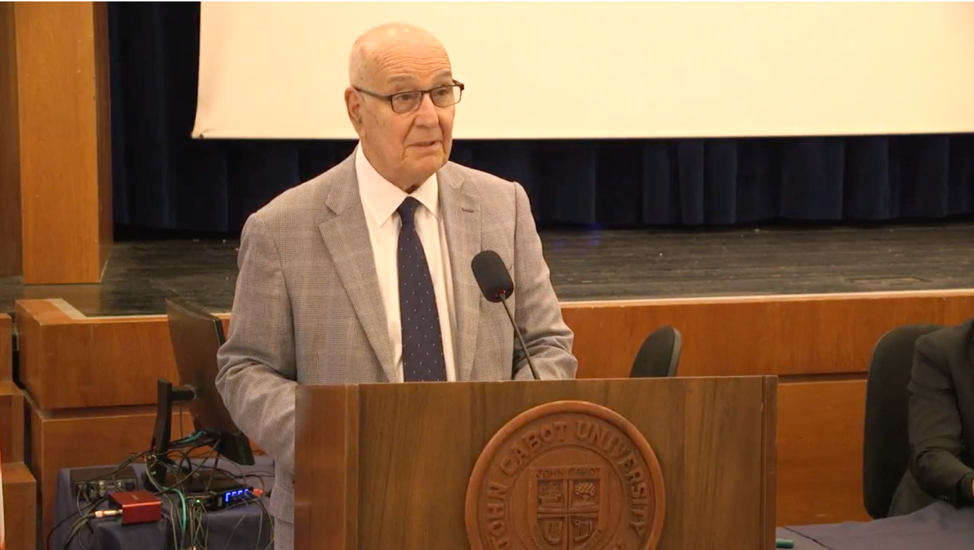
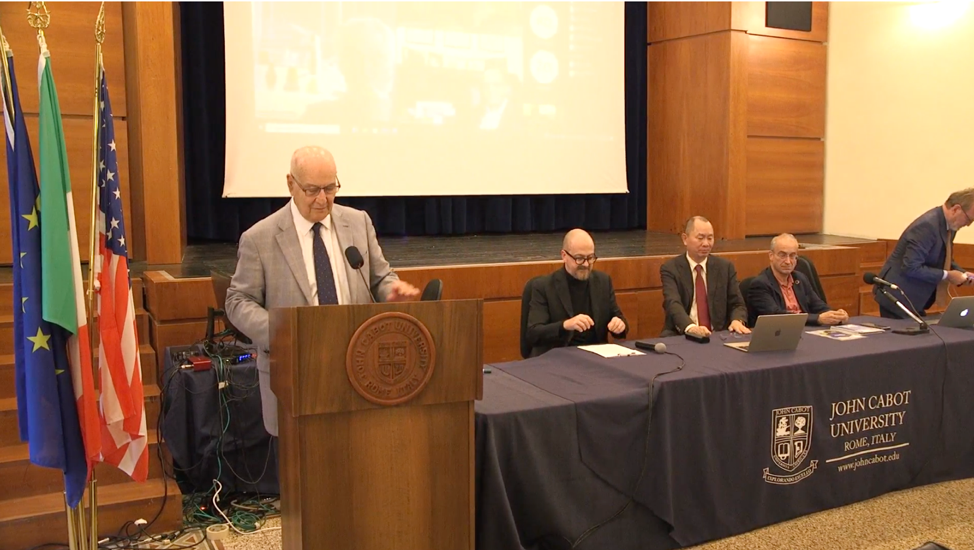
Franco Pavoncello, President of John Cabot University
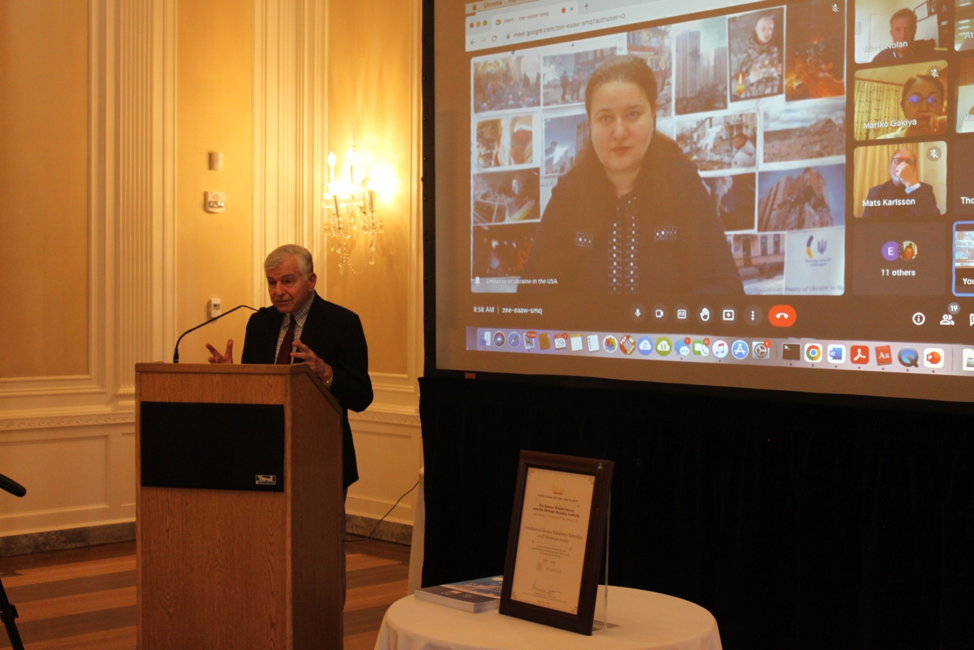
by Editor | Nov 6, 2022 | News
On November 3, 2022, Boston Global Forum leaders congratulate the birthday of Governor Michael Dukakis, co-founder and Chair of the Boston Global Forum, co-founder of the AI World Society (AIWS), who turn 89 this year. He is a high respectful, kind leader of BGF since its foundations. He fully dedicates and enthusiastically contributes to BGF, directly moderating events and conferences BGF. Many distinguished thinkers are surprise about his capacity, energy and adaptation of new things such as AI and digital when he chairs BGF discussions, especially for someone of his age.
BGF’s CEO Nguyen Anh Tuan and Governor Michael Dukakis prepare for ten anniversaries of Boston Global Forum and its significant event on November 22-23, 2022 at Harvard University, Loeb House.
From the success of BGF at the Riga Conference 2022 and Symposium “Technology for Peace and Democracy in the Age of Global Enlightenment” at John Cabot University in Rome, and recently meeting with UN Secretary General’s Envoy on Technology Amandeep Gill, leaders of BGF is developing the Manifesto “AIWS Actions to Create the Global Enlightenment Age.”
Based on standards, norms, concepts, principles, ideas from the book “Remaking the World – Toward an Age of Global Enlightenment,” the Manifesto lead by doing, now it is the time for actions.

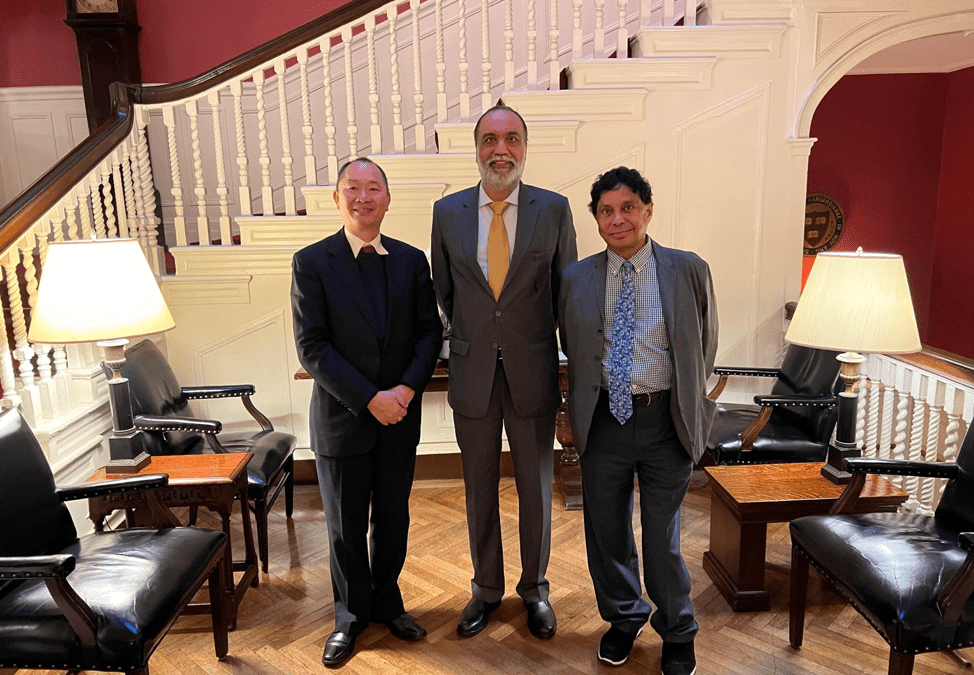
by Editor | Nov 6, 2022 | Global Alliance for Digital Governance
As a fundamental of the United Nations Centennial Initiative, the Global Alliance for Digital Governance will develop the plan “AI World Society Actions to create the Global Enlightenment Age” to support goals and targets of the United Nations’ Global Digital Compact and Roadmap for Digital Cooperation, the Summit of the Future in September 2023.
BGF will announce this plan at the conference on November 22, 2022 at Loeb House, Harvard University with attendence of United Nations Secretary-General’s Envoy on Technology Amandeep Gill and distinguished leaders, thinkers to celebrate 10 years anniversaries of Boston Global Forum.
On November 2, 2022, in New York, United Nations Secretary-General’s Envoy on Technology Amandeep Gill, Mr. Ramu Damodaran, co-chair of the United Nations Centennial Initiative and BGF CEO Mr. Nguyen Anh Tuan had a significant meeting for collaboration between BGF and the Office and key programs of United Nations Secretary-General’s Envoy on Technology.
On November 15, 2022, at Stanford University, Boston Global Forum CEO Nguyen Anh Tuan will discuss with Stanford scholars and business leaders at Silicon Valley about this plan.
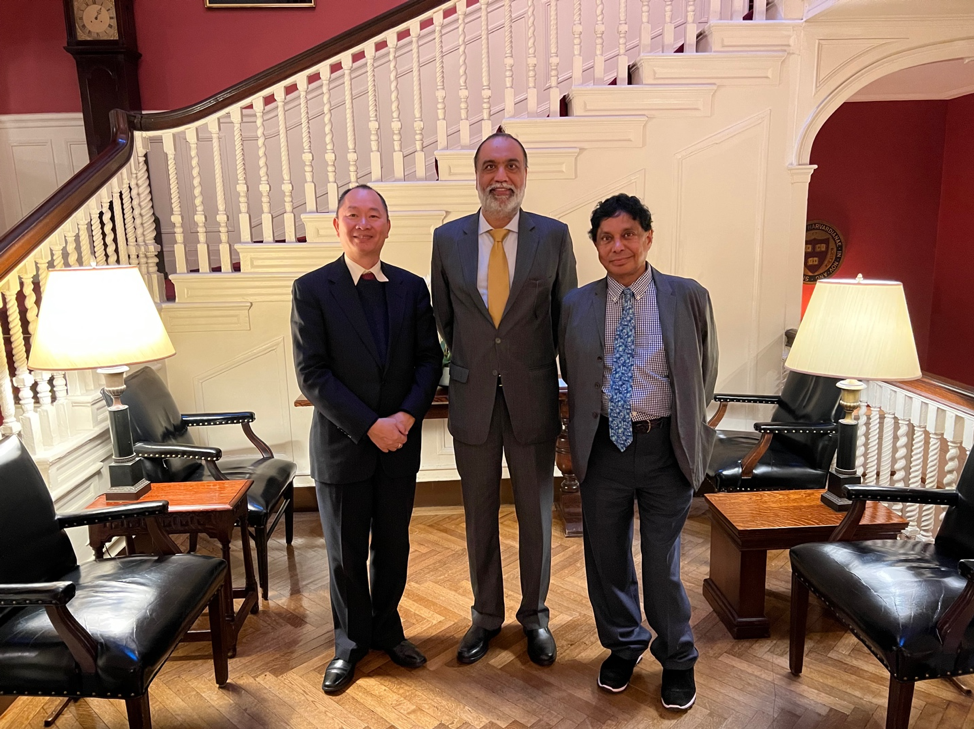
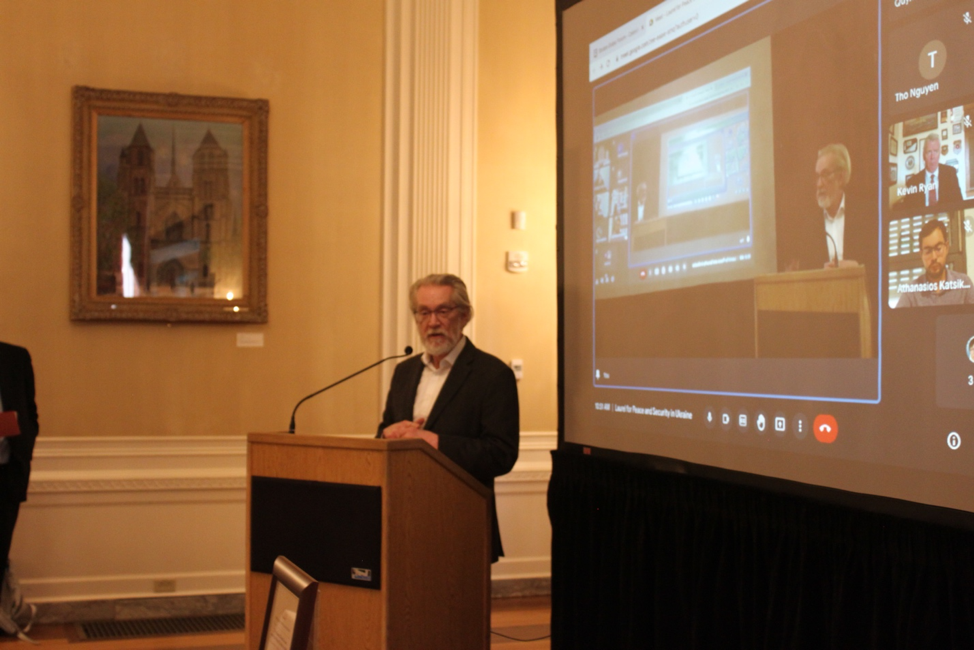
by Editor | Nov 6, 2022 | Event Updates
On November 15, 3:00 pm – 4:30 pm, PST, at Stanford University, Boston Global Forum CEO Nguyen Anh Tuan and MIT professor and Stanford Visiting Scholar Alex Pentland, BGF Board Member, will discuss with Stanford scholars and Silicon Valley business leaders about “AI World Society actions to create the Global Enlightenment Age”.
The United Nations established the Global Digital Compact, Roadmap for Digital Cooperation, and the Summit of the Future in September 2023, under leadership of the Envoy on Technology of UN Secretary General Amandeep Gill and his office.
The Boston Global Forum and UN Academic Impact established the United Nations Centennial Initiative, its fundamental is AI World Society (AIWS) and the book “Remaking the World – Toward an Age of Global Enlightenment” (AI International Accord, the Social Contract for the AI Age, etc.). Awareness of need to consolidate actions urgently, BGF and World leadership Alliance – Club de Madrid established the Global Alliance for Digital Governance (GADG) to coordinate global resources for actions for this mission.
Working with Technology Envoy Amandeep Gill, BGF collaborate and support programs of the United Nations such as the Global Digital Compact, Roadmap for Digital Cooperation and Summit of the Future of United Nations by the United Nations Centennial Initiative and GADG, special actions for a peaceful, secure and prosperous world.
In this meeting, participants also will discuss about products and services of Silicon Valley for the Global Enlightenment Age, and how Silicon Valley business leaders can contribute to the United Nations Centennial Initiative through the Global Enlightenment Club.


by Editor | Nov 6, 2022 | News
Franco Pavoncello, President of John Cabot University
Rome, October 25, 2022
Governor Dukakis, Distinguished panelists, ladies and gentlemen, I am Franco Pavoncello President of John Cabot University, and it is with great pleasure and honor that I welcome you all to JCU, for this Symposium: on Technology for Peace and Democracy in the Age of Global Enlightenment.
Organized by our “Institute of Future and Innovation Studies” in partnership with the “Boston Global Forum” and the “United Nations Centennial Initiative”, with the support of UN Under-Secretary-General, Tech Envoy Amandeep Gill.
The symposium is an official event of the “Global Alliance for Digital Governance (GADG)” An initiative launched in 2021 by the Boston Global Forum and the World Leadership Alliance-Club de Madrid.
And it is part of the Yearly Festival of Diplomacy which takes place each fall in Rome.
This is an important inaugural symposium, which brings together Europe ,Asia and the United States, In fact governing the challenges and promises of technological progress has never been as pivotal for the future of mankind as it is today. A time in which we are faced with the dilemma of the relationship between technology and democracy. We do indeed live in an age of scientific singularity with unprecedented planetary opportunities and challenges, where everything is connected, and the very concepts of time and distance appear to have been eliminated, in a world pulsating in unison 24/7.
The revolution ushered in by the arrival of internet and planetary communication, the concentration of technological means in the hands of the few, accompanied by the consequent concentration of wealth, poses important challenges, and new calls for decentralization and localization are rising. This is compounded by the fact that technological transformations have not been accompanied by ideological renewal, and the world appears still significantly ruled by ideological schemes produced by centuries old problems, in which scarcity, hunger, diseases were the norm.
We do live in a world of great problems, but let us be sure, also of great promises. We cannot ignore the enormous material progress of mankind and the expanding awareness of what it means to be free and to live a decent life. a widely shared, growing realization that is increasingly making our global civil societies reject violent, dictatorial deprivations of freedom and of the very basis of human existence. Sadly we have examples of that right before our eyes today.
But our hope for this march towards greater enlightenment rests first and foremost on the extent to which our younger generations share this aspiration and commitment.
As educators we should ensure that commitment, not by instilling in the mind of our students ready-set recipes about the future based on ideas of the past. Instead We must provide them with the empathy and curiosity, the attention to the unfamiliar, and critical and agile minds capable of capturing evolving future trends and challenges. But most of all we must alert them to the promise that constantly evolving scientific and technological progress offers, in the not too distant future, to the solution of problems that today look insurmountable and at times stop humanity’s progress.
That is why holding this symposium at this University, which is celebrating this year 50 years of serving as a bridge between culture and nations, takes on a special meaning, and so allow me to thank you all again for being here today on this important occasion. Welcome all to John Cabot University.



by Editor | Nov 6, 2022 | News
Francesco Lapenta, Ph.D., Director, John Cabot University’s Institute of Future and Innovation Studies
Rome, October 25, 2022
Rarely in human history have the high stakes of the relationships between technology, peace, democracy, and the future of Humanity and the planet been so clear. Or the relationships of the current interconnected crises with the technological choices of the past. The legacy of our modern technological history reverberates ominously today in the current crises, the concept of technological innovation as a form of perpetual competition, whether military, industrial, economic, or political, in which technological leadership and innovation are not viewed as a collective shared path toward the betterment of the human condition. But, as a permanent confrontation of ideologies, values, social and economic systems in constant competition or conflict, based not only on actual technological innovation and achievements, but also on the ability to direct and lead the future through technological and societal aspirations and goals.
Pragmatically, we cannot expect or even desire geopolitical competition to disappear, competition serving an important role in innovation and evolution. However history and nature have recently shown the high cost of various merely utilitarian choices in technological development that, although enormously socially transformative, have also contributed to a growing global social divide, rising economic inequality, the current climate crisis, an increasing number of health and social crises, and an unsustainable reliance on depletable and scarce resources for economic growth.
The history of technology also teaches us about the dynamic and complex relationship that has always existed between technological advancements and democratic principles and practices. Technology can be imagined and designed to be a tool for both private and public democratic participation. However when we look at even the most advanced democracies in the world, where new forms of corporate power and centralization, as well as changing forms of digital influence and surveillance, seem to undermine the very basis of fair and democratic participation, it becomes clear that the relationship between technology and democratic values and processes is never simple.
If democracies are to survive and win the battle against both authoritarian regimes and domestic challenges, they must be able to elaborate a future vision of the fair and democratic use of existing and emerging technologies. A future vision that views technological innovation’s sustainable development agenda as a necessary, collective, systemic effort to address what are increasingly seen as interconnected socioeconomic-ecological-geopolitical dynamics and global challenges. A vision and plan that can imagine how the world might change if technological evolution were driven and directed by a common vision of a future based on peace and the common good of the planet and humanity, even in the face of political and economic rivalry.


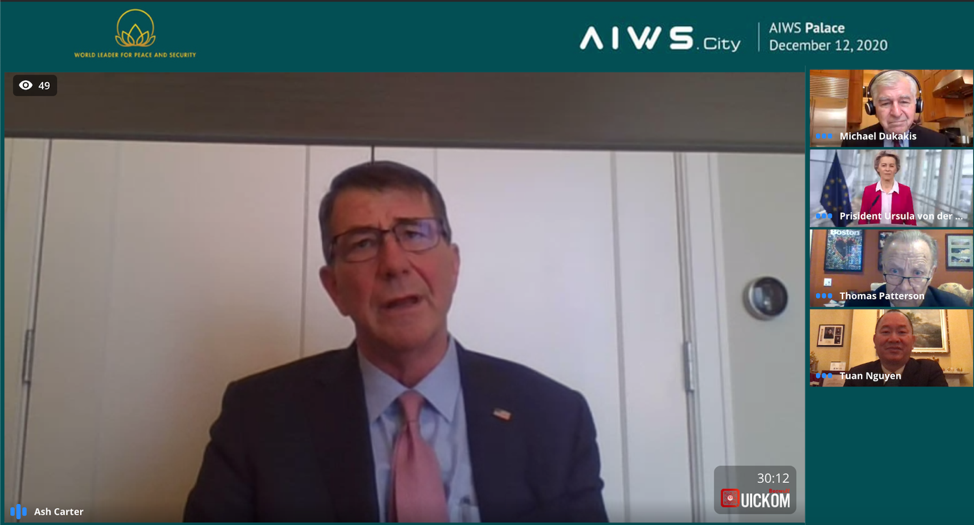
by Editor | Nov 4, 2022 | News
Boston, October 25, 2022
We were deeply saddened to learn of the recent death of Ash Carter, the former United States Secretary of Defense, who was an important contributor to Boston Global Forum (BGF)’s work on cybersecurity and peace.
In 2020, Secretary Carter addressed the BGF Global Cybersecurity Day Forum to speak about the technological risks posed by cyberthreats mounted by state and non-state actors. The Secretary’s background as a technology specialist and diplomat provided an important perspective for participants as we assessed the use technological tools in conflict situations. He stressed the importance of addressing these threats to multilateral organizations and non-profit groups with expertise on these issues.
Secretary Carter was a distinguished contributor to the book Remaking the World – Toward an Age of Global Enlightenment is a joint initiative by the Boston Global Forum and the United Nations Academic Impact as part of the United Nations Centennial Initiative.
The book proposes pathways toward a more humane, peaceful, and secure world, largely by harnessing the potential of Artificial Intelligence (AI), blockchain, and other Digital Age technologies. A key proposal is the adoption of an AI International Accord that would bind nations to constructive uses of AI and prohibit destructive uses. In addition, Remaking the World – Toward an Age of Global Enlightenment advances the Social Contract for the AI Age as the theoretical and ethical foundation of the Accord. The book also proposes the AI World Society (AIWS) as a vehicle through which individuals and civic organizations can help foster an Age of Global Enlightenment.
The Boston Global Forum executive team and leadership extends our condolences to the family and friends of Secretary Ash.











